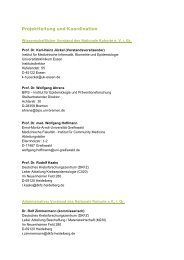Scientific Concept of the National Cohort (status ... - Nationale Kohorte
Scientific Concept of the National Cohort (status ... - Nationale Kohorte
Scientific Concept of the National Cohort (status ... - Nationale Kohorte
You also want an ePaper? Increase the reach of your titles
YUMPU automatically turns print PDFs into web optimized ePapers that Google loves.
A.3<br />
A.3 Study design<br />
routinely prepared for diagnostic evaluation. Prepared in this way, tissue samples remain<br />
stable for a long time (in principle for periods up to 100 years) and can be used fur<strong>the</strong>r for<br />
histological and molecular analyses. These formalin-fixed, paraffin-embedded tumor tissues<br />
represent <strong>the</strong> basis for preparing histological slides.<br />
Generally, tumor materials are not used up by <strong>the</strong> diagnostic process and remain in storage<br />
for several years at <strong>the</strong> respective pathology institutes, until <strong>the</strong>y are discarded because<br />
<strong>of</strong> space limitations and financial restrictions. Thus, most diagnostic archives are relatively<br />
short-term and, in addition, <strong>the</strong>y do not generally have common standards and rules for access<br />
to materials. For future research based on <strong>the</strong> tumor tissues within <strong>the</strong> <strong>National</strong> <strong>Cohort</strong><br />
it is, <strong>the</strong>refore, essential to establish a central tumor tissue bank that provides quality-assured<br />
storage, documentation, assessment, and release <strong>of</strong> <strong>the</strong>se materials for research purposes.<br />
The general collection <strong>of</strong> fresh-frozen tumor samples by <strong>the</strong> <strong>National</strong> <strong>Cohort</strong> is nei<strong>the</strong>r feasible<br />
nor is it necessary for <strong>the</strong> majority <strong>of</strong> research questions. Owing to various recent<br />
technical innovations, <strong>the</strong> vast majority <strong>of</strong> relevant molecular analyses can be performed<br />
with formalin-fixed, paraffin-embedded tumor tissues. Largely unrestricted analyses will be<br />
possible in <strong>the</strong> areas <strong>of</strong> DNA analysis (genomic imbalances, translocations, mutations), epigenetics<br />
(methylation assays), transcript (RNA expression) analysis, and analysis <strong>of</strong> noncoding<br />
RNAs, and histology (including special stains and immunohistology).<br />
From formalin-fixed, paraffin-embedded tumor tissues, standardized derivatives such as<br />
nucleic acids, protein extracts, and multitissue arrays can be produced for fur<strong>the</strong>r analyses<br />
in <strong>the</strong> context <strong>of</strong> well-planned, nested projects, making efficient use <strong>of</strong> <strong>the</strong> limited tumor<br />
materials available. For reasons <strong>of</strong> efficiency, quality control, and subsequent archiving and<br />
distribution, <strong>the</strong>se derivatives will be produced in <strong>the</strong> context <strong>of</strong> <strong>the</strong> central tumor tissue<br />
bank. Fur<strong>the</strong>rmore, <strong>the</strong> use <strong>of</strong> tissue materials for various laboratory analyses generally<br />
requires that <strong>the</strong> material be re-examined by pathology experts, and this, too, should be<br />
performed at an institution that can provide <strong>the</strong> relevant histopathological expertise.<br />
Suggested site for <strong>the</strong> tumor biobank (NCT, Heidelberg)<br />
The existing infrastructures <strong>of</strong> <strong>the</strong> tissue biobank <strong>of</strong> NCT in Heidelberg will provide optimal<br />
support for <strong>the</strong> tissue biobank <strong>of</strong> <strong>the</strong> <strong>National</strong> <strong>Cohort</strong> for <strong>the</strong> following reasons:<br />
� Ethical and legal situation: The tissue biobank <strong>of</strong> NCT in Heidelberg has received<br />
broad ethical approval for prospective tissue collection and retrospective use <strong>of</strong> previously<br />
collected samples for research purposes.<br />
� Project management and experience: With more than 620 completed projects, <strong>the</strong><br />
NCT tissue biobank has <strong>the</strong> highest project experience in centralized tumor banking<br />
in central Europe. Active project management in standardized project tracking and<br />
specific experience in supporting large population-based epidemiologic studies are<br />
available.<br />
� Technical standards: The tissue biobank <strong>of</strong> NCT in Heidelberg <strong>of</strong>fers a broad technology<br />
platform (all relevant histological methods, multitissue array production, nucleic<br />
acid technology, microdissection, virtual microscopy, and image analysis). Especially<br />
tissue microarray technology joined with virtual microscopy is <strong>of</strong> great use for managing<br />
decentralized tissue-based projects and was implemented successfully in <strong>the</strong> past.<br />
� Quality management: The tissue biobank at NCT has implemented a comprehensive<br />
quality management system and is <strong>the</strong> only accredited tissue biobank in central Europe.<br />
All processes are guided by SOPs and are monitored by internal and external<br />
audits. The tissue biobank is supervised twice annually by its advisory board, annually<br />
by NCT, and every 3 years by an international review board.<br />
124



